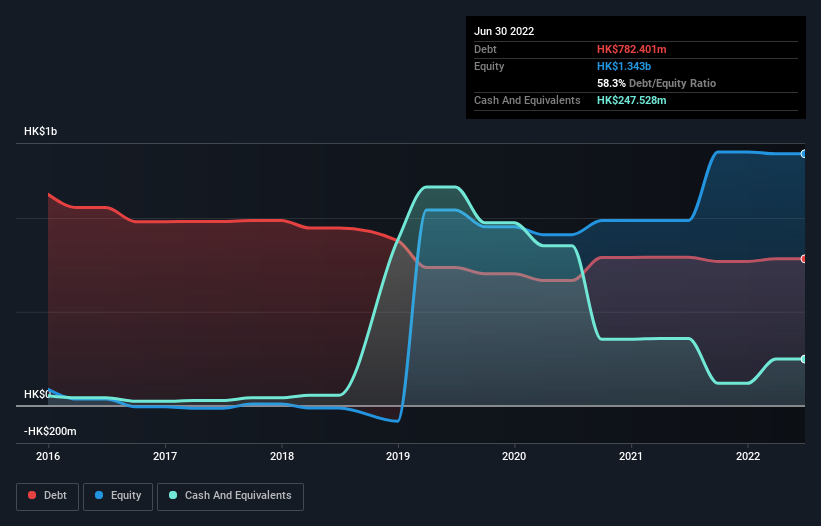Warren Buffett famously said, 'Volatility is far from synonymous with risk.' When we think about how risky a company is, we always like to look at its use of debt, since debt overload can lead to ruin. We can see that Hans Energy Company Limited (HKG:554) does use debt in its business. But the more important question is: how much risk is that debt creating?
What Risk Does Debt Bring?
Debt assists a business until the business has trouble paying it off, either with new capital or with free cash flow. In the worst case scenario, a company can go bankrupt if it cannot pay its creditors. However, a more frequent (but still costly) occurrence is where a company must issue shares at bargain-basement prices, permanently diluting shareholders, just to shore up its balance sheet. Having said that, the most common situation is where a company manages its debt reasonably well - and to its own advantage. When we examine debt levels, we first consider both cash and debt levels, together.
Check out our latest analysis for Hans Energy
What Is Hans Energy's Net Debt?
The chart below, which you can click on for greater detail, shows that Hans Energy had HK$782.4m in debt in June 2022; about the same as the year before. However, because it has a cash reserve of HK$247.5m, its net debt is less, at about HK$534.9m.

How Strong Is Hans Energy's Balance Sheet?
According to the last reported balance sheet, Hans Energy had liabilities of HK$416.2m due within 12 months, and liabilities of HK$514.9m due beyond 12 months. On the other hand, it had cash of HK$247.5m and HK$229.1m worth of receivables due within a year. So its liabilities total HK$454.5m more than the combination of its cash and short-term receivables.
This is a mountain of leverage relative to its market capitalization of HK$469.4m. This suggests shareholders would be heavily diluted if the company needed to shore up its balance sheet in a hurry. The balance sheet is clearly the area to focus on when you are analysing debt. But you can't view debt in total isolation; since Hans Energy will need earnings to service that debt. So when considering debt, it's definitely worth looking at the earnings trend. Click here for an interactive snapshot.
In the last year Hans Energy had a loss before interest and tax, and actually shrunk its revenue by 78%, to HK$685m. That makes us nervous, to say the least.
Caveat Emptor
Not only did Hans Energy's revenue slip over the last twelve months, but it also produced negative earnings before interest and tax (EBIT). Indeed, it lost HK$25m at the EBIT level. When we look at that and recall the liabilities on its balance sheet, relative to cash, it seems unwise to us for the company to have any debt. So we think its balance sheet is a little strained, though not beyond repair. On the bright side, we note that trailing twelve month EBIT is worse than the free cash flow of HK$306m and the profit of HK$4.3m. So one might argue that there's still a chance it can get things on the right track. When analysing debt levels, the balance sheet is the obvious place to start. However, not all investment risk resides within the balance sheet - far from it. For example, we've discovered 2 warning signs for Hans Energy that you should be aware of before investing here.
If, after all that, you're more interested in a fast growing company with a rock-solid balance sheet, then check out our list of net cash growth stocks without delay.
Valuation is complex, but we're here to simplify it.
Discover if Hans Group Holdings might be undervalued or overvalued with our detailed analysis, featuring fair value estimates, potential risks, dividends, insider trades, and its financial condition.
Access Free AnalysisHave feedback on this article? Concerned about the content? Get in touch with us directly. Alternatively, email editorial-team (at) simplywallst.com.
This article by Simply Wall St is general in nature. We provide commentary based on historical data and analyst forecasts only using an unbiased methodology and our articles are not intended to be financial advice. It does not constitute a recommendation to buy or sell any stock, and does not take account of your objectives, or your financial situation. We aim to bring you long-term focused analysis driven by fundamental data. Note that our analysis may not factor in the latest price-sensitive company announcements or qualitative material. Simply Wall St has no position in any stocks mentioned.
About SEHK:554
Hans Group Holdings
An investment holding company, provides terminal, jetties, storage tanks, and warehousing and logistic services for petroleum, liquid chemical, and gas products in the People’s Republic of China.
Good value with imperfect balance sheet.
Market Insights
Community Narratives



